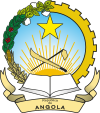
Back Reinu de Ndongo AST Ндонга Byelorussian এনডোঙ্গো রাজ্য Bengali/Bangla Regne de Ndongo Catalan Königreich Ndongo German Reino de Ndongo Spanish Ndongoko Erresuma Basque Ndongo Finnish Royaume de Ndongo French Reino de Ndongo Galician
This article includes a list of general references, but it lacks sufficient corresponding inline citations. (August 2014) |
Kingdom of Ndongo Dongo, Andongo | |||||||
|---|---|---|---|---|---|---|---|
| 1358–1683 | |||||||
|
Flags according to Giovanni Cavazzi da Montecuccolo, 1650s | |||||||
 | |||||||
| Status | Sovereign kingdom | ||||||
| Capital | Kabasa | ||||||
| Common languages | Kimbundu | ||||||
| Religion | Bukongo Catholicism Antonianism | ||||||
| History | |||||||
• Established | 1358 | ||||||
• The war against the Kingdom of Kongo | 1556 | ||||||
| 1647 | |||||||
• The signing of a treaty between Queen Nzhinga and the Kingdom of Portugal | 1657 | ||||||
• Portugal's colonization of Ndongo | 1683 | ||||||
| |||||||
| Today part of | Angola | ||||||
| Historical states of present-day Angola |
|---|
 |
The Kingdom of Ndongo (formerly known as Angola or Dongo, also Kimbundu: Utuminu ua Ndongo, Utuminu ua Ngola) was an early-modern African state located in the highlands between the Lukala and Kwanza Rivers, in what is now Angola.[1][2]
The Kingdom of Ndongo is first recorded in the sixteenth century. It was one of multiple vassal states to Kongo, though Ndongo was the most powerful of these with a king called the Ngola.
Little is known of the kingdom in the early sixteenth century. "Angola" was listed among the titles of the King of Kongo in 1535, so it was likely somewhat subordinate to Kongo. Its oral traditions, collected in the late sixteenth century, particularly by the Jesuit Baltasar Barreira, described the founder of the kingdom, Ngola Kiluanje, also known as Ngola Inene, as a migrant from Kongo, chief of a Kimbundu-speaking ethnic group.[3]
- ^ Austin, Beth (2018). "1619: Virginia's First Africans". Hampton History Museum. Retrieved May 9, 2023.
- ^ Samuel, isaac. "The kingdom of Ndongo and the Portuguese: Queen Njinga and the dynasty of women sovereigns (1515-1909)". www.africanhistoryextra.com. Retrieved 2023-05-20.
- ^ Cite error: The named reference
:3was invoked but never defined (see the help page).

